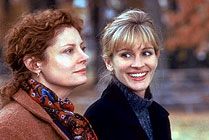|
|
|
|
Stepmom
|
 |
|
One of the fault-lines in all discussion of film, however casual or formal, is the one that separates those who value authentic emotion in a movie from those who shamelessly seek what Bette Davis in All About Eve (1950) labelled "cheap sentiment". The reason this argument will rage forever is that no one can ever possibly devise an objective way of distinguishing between these two forms of feeling. Certain highly successful Hollywood movies – glossy, formulaic, corny, contrived – raise this issue with particular acuteness. No matter how obviously ersatz they may be, these films nonetheless please crowds by providing them with a generous opportunity to luxuriate in cheap sentiment. And, from a sympathetic angle, this can seem as deep and valuable an experience as anything Great Art can give us. Stepmom is not Great Art, but it certainly works like a charm. It is a movie designed to confound critics: just about everything in it is predictable, clichéd and stylised so as to avoid any complicating or challenging ideas. It manipulates us relentlessly by pressing buttons relating to our anxieties about ageing, mortality and solitude. It's a family-values tract, tweaked just enough to accommodate one or two modern, lifestyle realities. It's a feel-good splurge, but one that admits in passing how malicious, vain and competitive we can all sometimes be. Isabel (Julia Roberts), a hip, young, fashion photographer, is involved with an older divorcee, Luke (Ed Harris). His kids, troubled teen Anna (Jena Malone) and cheeky little Ben (Liam Aiken), shuttle between his pad and that of their mother, Jackie (Susan Sarandon). Pretty soon, the focus of the story is squarely on the women, as they tenaciously struggle for control of the hearts and minds of the children. Director Chris Columbus, working from a script that seems to have been spiced by many different hands, cannot shake off any of the slick tricks he has learnt making the early '90s Home Alone series for writer-producer John Hughes. Yet Columbus is also at pains to remind us that he began his brilliant career making more personal movies about suburban frolics (Adventures in Babysitting, 1987) and pop-inspired dreams (Heartbreak Hotel, 1988) – a legacy reflected here in charming sing-along scenes and fond vignettes of domestic chaos. Roberts gets to run through her usual star repertoire of looks and poses: she pouts, laughs and smiles, now crumpling in distress, then letting herself be carried away by a wave of rapture. Harris, stranded on the edge of the plot, appears laudably sensitive, caring and introspective. But Sarandon is the real star of this movie, because she is its virtual dark side. Stern, sullen and – for one breathtaking scene – monstrously self-centred, Jackie embodies a fine dramatic principle: by holding most of her emotion in, she eventually prompts a flood of feeling in the audience. Sarandon has a ball with Jackie's black wit, her fierce pride, and her more sombre, withdrawn moods. Watching this great actress at work, you cannot tell whether her character, finally, is merely a two dimensional stereotype or really a deep, three dimensional individual – just as you cannot fathom whether the tears this film lets you gratefully shed are a soulful release, or just reflex conditioning. Either way, Stepmom hits the spot. MORE Columbus: Bicentennial Man, Harry Potter and the Chamber of Secrets, Mrs Doubtfire, Nine Months, Only the Lonely © Adrian Martin January 1999 |
![]()